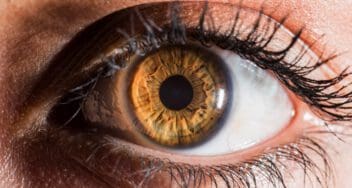
Medically Reviewed by Tom Tooma, M.D., Founder/Medical Director NVISION Surgeon
What if You Blink or Sneeze During LASIK Surgery?
Home / Keratoconus: Signs, Timelines & Treatments /
Last Updated:

Medically Reviewed by Tom Tooma, M.D., Founder/Medical Director NVISION Surgeon
It is normal to fear involuntary movements, such as sneezing, coughing, or blinking during LASIK, but there is no need to! For one, medications and special tools are used to ensure that you cannot blink, and your eyes stay still during the procedure.
Table of Contents
Advanced technologies today also account for small movements and will pause or readjust if you do sneeze or cough during LASIK. The LASIK procedure is very quick from start to finish and does not leave you much time to worry about moving.
LASIK is a quick and effective procedure for correcting refractive errors. Highly trained medical staff help to ensure your comfort and safety before, during, and after the procedure.
You Will Be Unable to Blink

During a LASIK procedure, you will be slightly reclined, and special numbing drops will be placed into your eyes that make them less likely to blink. The drops help you to not feel the urge to blink, and they also help to dispel any discomfort.
You will be awake during LASIK. The medical staff will ensure that you are relaxed and comfortable. If you are nervous, your doctor can prescribe some medication to help you relax before and during the procedure.
You deserve clear vision. We can help.
With 135+ locations and over 2.5 million procedures performed, our board-certified eye surgeons deliver results you can trust.
Your journey to better vision starts here.
Additionally, a tool called a lid speculum (a medical device) is placed on your eyes to gently hold your eyelids open during the procedure. To keep your eye from moving at all, a suction ring is also placed on the eye itself during LASIK surgery. This can cause your vision to dim temporarily.
In short, there is no need to worry about blinking or your eyes moving during LASIK. Your eyes will be stable; they will not move during the procedure.
Advanced Technology Accounts for Movements
LASIK technology has come a long way over the years. Today, it uses extremely advanced technology that is very precise in measuring your eyes, reshaping your cornea, and accounting for any potential movements. During the LASIK procedure, if you sneeze, cough, or make an involuntary movement, the laser will pause and wait. It can also readjust itself accordingly.
The sophisticated laser tracks and compensates for the movements of your eye. There are several different types of lasers in use with specialized procedures. All use highly advanced tools and technology. Your surgeon can help you decide on the best option for you and your eyes specifically,
LASIK surgery is considered very safe and effective. Overall, 96 percent of people who undergo the procedure are satisfied with the results.
Advanced technology is able to correct your vision more precisely and also in a safer manner. Ophthalmologists undergo advanced training to work with these specialized tools and sophisticated technology.
A Fast Procedure

The typical LASIK procedure takes around a half-hour to complete from start to finish. The majority of the time is spent talking with the surgeon, setting up for the surgery, and in recovery after the procedure.
You will be given a target light to focus on during the short amount of time the laser is actually focused directly on your eye. Often, the actual cutting part takes less than one or two minutes. As a result, you don’t need to hold still for very long. The quickness of the procedure can help to eliminate any fear of movement.
Blinking, sneezing, coughing, and small involuntary movements are not going to impact the outcome of your LASIK procedure. The surgery has many measures in place to ensure a successful outcome.
You deserve clear vision. We can help.
With 135+ locations and over 2.5 million procedures performed, our board-certified eye surgeons deliver results you can trust.
Your journey to better vision starts here.
References
- What Should I Expect Before, During, and After Surgery? (July 2018). U.S. Food and Drug Administration (FDA).
- LASIK: Laser Eye Surgery. (October 2020). American Academy of Ophthalmology (AAO).
- Latest Generation LASIK Technology Helps Patients Achieve Best Vision. (September 2019). Ocular Surgery News.
- LASIK Complication Rate: The Latest Facts and Stats You Should Know. (October 2017). American Refractive Surgery Council (ARSC).
- What to Know About LASIK Surgery. (January 2021). Medical News Today.

Dr. Tooma, the founder of NVISION® Eye Centers, has performed well over 130,000 LASIK surgeries, making him the most experienced LASIK surgeon in the Western United States.
This content is for informational purposes only. It may have been reviewed by a licensed physician, but is not intended to serve as a substitute for professional medical advice. Always consult your healthcare provider with any health concerns. For more, read our Privacy Policy and Editorial Policy.

